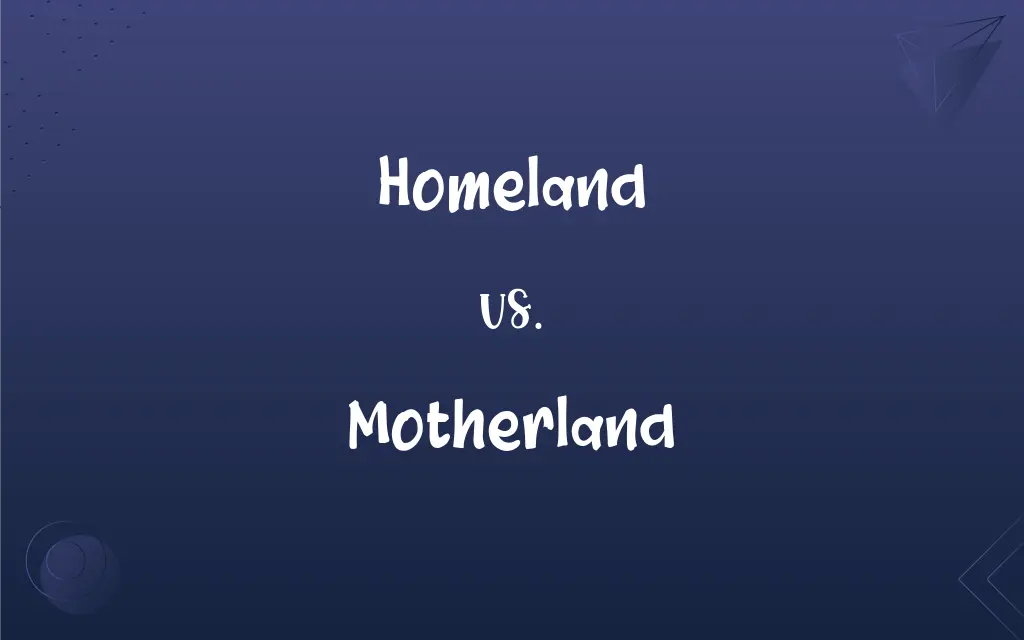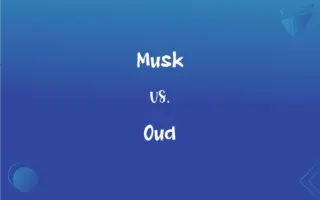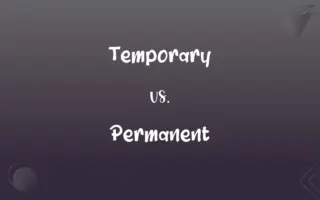Homeland vs. Motherland: What's the Difference?
Edited by Harlon Moss || By Janet White || Updated on November 29, 2023
Homeland refers to one's native country or region, while motherland is a more emotive term for one's native country, often implying birth and origin.

Key Differences
Homeland is a term used to describe a person's native or ancestral country, often associated with citizenship and residence. Motherland, on the other hand, carries a more emotive, often nationalistic connotation, implying the place of one's birth or the origin of one's ancestors.
Homeland can be a place of current dwelling or origin, emphasizing legal or physical connection. Motherland tends to evoke a deeper sense of belonging and cultural identity, often used in patriotic or historical contexts.
The concept of homeland is frequently associated with legal and political aspects, such as in discussions of homeland security. In contrast, motherland is more likely used in cultural and emotional discussions, reflecting a deep-rooted connection to one’s origins.
Homeland can change for individuals who migrate, as it can refer to both the country of origin and the adopted country. Motherland typically remains constant, signifying the country of one’s birth or ancestral origin.
In practical usage, homeland is often a neutral term, whereas motherland carries more emotional weight and is sometimes used in a more idealized or romanticized way.
ADVERTISEMENT
Comparison Chart
Connotation
Neutral, legalistic
Emotional, often nationalistic
Implication
Place of residence or origin
Place of birth or ancestral origin
Usage Context
Legal, political, personal
Cultural, historical, emotional
Flexibility
Can change with migration
Typically constant, linked to birth
Emotional Weight
Generally more neutral
Heavier, often idealized
ADVERTISEMENT
Homeland and Motherland Definitions
Homeland
Country of origin or citizenship.
She returned to her homeland after many years.
Motherland
Symbolic term for the nation from which one’s family originates.
Stories of the motherland were passed down through generations.
Homeland
Nation to which one feels a strong attachment.
The immigrant spoke fondly of his homeland.
Motherland
A term used to evoke patriotic feelings.
They sang songs in honor of the motherland.
Homeland
Place where one’s family or ancestors originated.
He visited his ancestors' homeland.
Motherland
Country of one’s birth or ancestry.
The poet wrote nostalgically about the motherland.
Homeland
Region where a person was born or grew up.
The homeland's landscapes remained in her memory.
Motherland
A place with strong emotional and cultural ties.
He always carried a piece of the motherland in his heart.
Homeland
Geographical area associated with a particular ethnic group.
The festival celebrated the culture of their homeland.
Motherland
Ancestral homeland, often idealized.
Her paintings captured the beauty of her motherland.
Homeland
One's native land.
Motherland
One's native land.
Homeland
A state, region, or territory that is closely identified with a particular people or ethnic group.
Motherland
The land of one's ancestors.
Homeland
Any of the ten regions designated by South Africa in the 1970s as semiautonomous or nominally independent territories for the black population. The black homelands were dissolved and reincorporated into South Africa in 1994.
Motherland
A country considered as the origin of something.
Homeland
The country that one regards as home.
Motherland
The country of one's ancestors.
Homeland
One's country of residence.
Motherland
The country of one's birth.
Homeland
One's country of birth.
Motherland
Country of origin.
Homeland
The traditional territory of an ethnic group.
Motherland
Mother country in contrast to its colonies.
Homeland
An area set aside for black South Africans under the policy of apartheid.
Motherland
The country of one's ancestors; - same as fatherland.
Homeland
The country where you were born
Motherland
The country where you were born
FAQs
What is a homeland?
A person's native or ancestral country.
Can homeland refer to an adopted country?
Yes, it can signify either the country of origin or the adopted country.
Is motherland a political term?
It's more cultural and emotional than political.
What does motherland mean?
The country of one's birth or ancestry, often with emotional significance.
Is homeland a legal term?
It can be, especially in contexts like 'homeland security'.
How do people use homeland in conversation?
Often to refer to their country of origin or residence.
Can motherland be used in a modern context?
Yes, but it's often associated with historical or cultural narratives.
Does motherland have different meanings?
It mainly refers to one's birthplace or ancestral nation.
Can someone have multiple homelands?
Yes, especially in the context of dual nationality or migration.
Is motherland used commonly?
It's used, but often in more emotive or patriotic contexts.
Can homeland change over time?
Yes, particularly for migrants or those with dual citizenship.
Does motherland imply a deeper connection than homeland?
Generally, it conveys a deeper emotional and cultural bond.
Can homeland security refer to any country?
Yes, it's a general term for national security measures.
Is motherland always the country of birth?
Typically, but it can also refer to ancestral origins.
How do expatriates view their homeland?
Often with a sense of connection, whether it's birthplace or residence.
Is homeland an emotional term?
Less so than motherland, as it's often used in a more factual sense.
Do people feel a duty to their motherland?
Many do, often expressed through cultural or patriotic acts.
How do artists represent motherland?
Often with a sense of nostalgia, pride, or cultural heritage.
Does motherland have different connotations in different cultures?
Yes, its significance can vary based on cultural context.
Is homeland used in legal documents?
It can be, particularly in immigration and citizenship contexts.
About Author
Written by
Janet WhiteJanet White has been an esteemed writer and blogger for Difference Wiki. Holding a Master's degree in Science and Medical Journalism from the prestigious Boston University, she has consistently demonstrated her expertise and passion for her field. When she's not immersed in her work, Janet relishes her time exercising, delving into a good book, and cherishing moments with friends and family.
Edited by
Harlon MossHarlon is a seasoned quality moderator and accomplished content writer for Difference Wiki. An alumnus of the prestigious University of California, he earned his degree in Computer Science. Leveraging his academic background, Harlon brings a meticulous and informed perspective to his work, ensuring content accuracy and excellence.































































